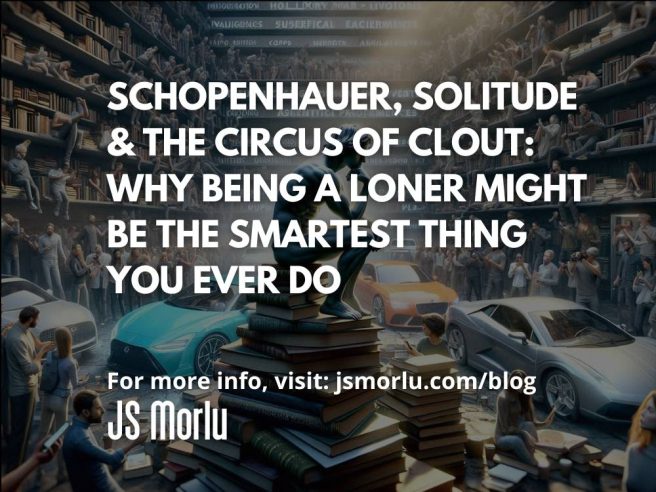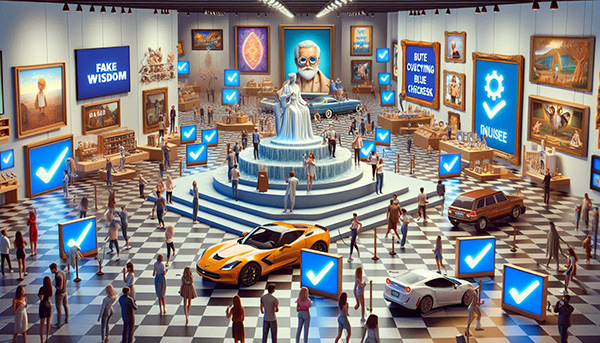By: John S. Morlu II, CPA – Philosopher-in-Observation of the External Validation Syndrome
In a world where everybody’s dancing for the algorithm — one retweet away from an existential crisis — Arthur Schopenhauer whispers from the grave:
“You’re doing too much.”
And frankly, he’s right.
We’re drowning in an ocean of likes, filters, motivational quotes, self-branding, and “Hey guys, just wanted to hop on here real quick” videos. Meanwhile, inner peace is curled up in the corner, rocking back and forth, wondering if anyone will remember what it looked like.
But not Schopenhauer.
He opted out.
He unplugged before there were even plugs.
He basically invented the mental version of airplane mode.
Let’s talk about how and why that lonely, dog-walking German philosopher might have cracked the code on living authentically in a world obsessed with applause.
Who Was Schopenhauer, Really?
Arthur Schopenhauer was born in 1788 into a wealthy merchant family. But unlike the average trust-fund baby, he didn’t spend his inheritance on wine, wigs, or weird aristocratic parties.
Nope. He bought books, read Eastern philosophy, learned Greek, studied Kant, and started dissecting the human condition like it owed him money.
By 25, he was doing mental gymnastics that would make today’s Twitter philosophers cry into their turmeric lattes.
But here’s the thing: He wasn’t liked.
- His students abandoned his lectures.
- His contemporaries dismissed him.
- He argued with his mother (a famous novelist) about the shallowness of society.
- He once pushed a woman down the stairs in a housing dispute (okay, not great).
And still — this man never stopped thinking.
Today, the very ideas that got him ignored now echo across university halls, therapy offices, Stoic Reddit threads, and every Gen Z who’s deleted Instagram for “mental health reasons.”
Loner Status: From Social Outcast to Philosophical Royalty
Let’s face it:
Modern culture is obsessed with groupthink, networking, and being seen.
We’re told that if we’re not “putting ourselves out there,” we’ll fall behind.
That if we don’t build our “personal brand,” we’ll disappear.
That if we don’t attend the conference, we’ll miss our “next big connection.”
But Schopenhauer?
“A man can be himself only so long as he is alone.”
That hits harder than your last unpaid internship.
He believed solitude wasn’t just necessary — it was the only condition under which the authentic self could truly exist.
You want to think clearly? Sit alone.
Want to create something real? Turn off the world.
Want to evolve? Disconnect, then reconnect with yourself.
Being alone, to Schopenhauer, wasn’t loneliness.
It was liberation.
A detox from society’s expectations, comparisons, and distractions.
The World Today: A Costume Party With No Exit
We live in a time where:
- People Google “how to be authentic” and still end up using chatbots to write their wedding vows.
- Teenagers are editing their faces with apps they can’t even pronounce, chasing digital perfection that doesn’t exist.
- Adults are still posting birthday photos with captions like: “Chapter 37: Gratitude, Growth, and Grinding” — as if life were a self-help manual nobody asked to read.
- And people cry online just enough to get sympathy — but not so much that they mess up the lighting.
It’s a global masquerade ball, and the masks are made of insecurities, algorithms, and imposter syndrome.
Schopenhauer saw this coming.
Even in the 1800s, he called public life a farce — a stage where everyone’s acting, but no one knows who wrote the script.
And now?
We’ve industrialized it. Monetized it.
We call it influence.
More Fun Facts: The Poodle With a PhD
Let’s take a break and appreciate something sweet:
Schopenhauer had a white poodle named Atma, which means “the soul” in Sanskrit.
He didn’t just walk Atma — he talked to him. He dined with him. He considered him superior company to most humans.
Atma barked during lectures, sat by his desk during writing, and was mentioned in his will.
He left actual money to his dog’s caretaker.
Meanwhile, your neighbor won’t even leave you their Wi-Fi password.
Schopenhauer didn’t need followers.
He had a dog. And a soul. And a stack of books that weighed more than your ring light setup.
Brutal Honesty: Most People Are Just Echo Chambers With Egos
Let’s break this down:
People are not original.
They don’t want the truth.
They want a version of the truth that flatters them.
Schopenhauer called this the “Will” — an irrational, chaotic force that drives human behavior, craving satisfaction it can never hold.
- You want success? It fades.
- You want love? You fear losing it.
- You want fame? It eats your soul.
- You want peace? You scroll past it looking for dopamine.
Here’s a hard truth from the Schopenhauer school of thought:
Most people are chasing desires that aren’t even theirs — just hand-me-down cravings from culture, capitalism, and childhood trauma.
Schopenhauer’s Guide to Not Losing Your Mind in the Age of Distraction
1. Read old books — they weren’t trying to trend.
2. Question every desire — is it yours, or is it marketing?
3. Practice radical solitude — where you face your unfiltered self.
4. Refuse performance — let your value exist without applause.
5. Own your boredom — it’s the birthplace of insight, not a problem to fix.
Boredom, by the way, is what modern apps fear the most.
Because boredom births introspection — and introspection breaks the machine.
Modern Madness: A Museum of Absurdity
We’re surrounded by absurdity disguised as achievement:
- Influencers posting “deep reflections” sponsored by hair vitamins.
- Men flexing Lamborghinis they don’t own while living in rented apartments.
- Online coaches with no track record teaching people how to “10x their mindset.”
- People paying for blue checkmarks like it’s a badge of emotional security.
If Schopenhauer had a Twitter account, he’d probably just post one word:
“Delete.”
And then block everyone.
Schopenhauer’s Loner Manifesto (If He Had a Substack)
- Solitude is not a curse. It’s a canvas.
- Crowds do not equal truth.
- Being liked is not the same as being wise.
- You don’t need to be seen to matter.
- External validation is a drug. Withdrawal is enlightenment.
Why the Real Ones Are Always a Bit Distant
Ever notice how the most genuine people aren’t always available?
They’re not rude. They’re just… doing their own thing.
Reading. Thinking. Healing. Creating.
Not tweeting about “doing the work.” Actually doing it.
They’ve got boundaries, not bitterness.
Solitude, not sadness.
Discernment, not drama.
They make you wonder:
“What do they know that I don’t?”
Here’s your answer:
They know that the world’s loudest rooms often have the least meaning.
Final Word: You’re Not Antisocial. You’re Just Awake.
There’s nothing wrong with you if you hate small talk, feel uneasy in shallow conversations, or would rather spend Friday night reading Schopenhauer with your cat.
You’re not broken.
You’re just allergic to noise.
You’re just awake — in a world that sells sleepwalking as ambition.
As Schopenhauer once said:
“To live alone is the fate of all great souls.”
So go ahead.
Cancel that unnecessary lunch.
Mute the drama.
Exit the group chat.
Pick up a book. Take a long walk.
And let your brain marinate in silence until it produces something real.
🖋️ By: John S. Morlu II, CPA
CEO, Thinker, Escapee from the Algorithm’s Mind Trap
Author: John S. Morlu II, CPA is the CEO and Chief Strategist of JS Morlu, leads a globally recognized public accounting and management consultancy firm. Under his visionary leadership, JS Morlu has become a pioneer in developing cutting-edge technologies across B2B, B2C, P2P, and B2G verticals. The firm’s groundbreaking innovations include AI-powered reconciliation software (ReckSoft.com) and advanced cloud accounting solutions (FinovatePro.com), setting new industry standards for efficiency, accuracy, and technological excellence.
JS Morlu LLC is a top-tier accounting firm based in Woodbridge, Virginia, with a team of highly experienced and qualified CPAs and business advisors. We are dedicated to providing comprehensive accounting, tax, and business advisory services to clients throughout the Washington, D.C. Metro Area and the surrounding regions. With over a decade of experience, we have cultivated a deep understanding of our clients’ needs and aspirations. We recognize that our clients seek more than just value-added accounting services; they seek a trusted partner who can guide them towards achieving their business goals and personal financial well-being.
Talk to us || What our clients says about us






